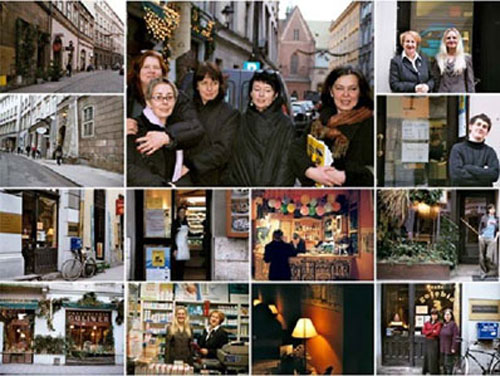BRACKA STREET FESTIVAL

Once a year the owners of the shops leave them open a few hours longer.
Key Innovation
An annual street festival promoting shops, restaurants, galleries and integrating inhabitants of the Bracka street.
Problematic background and context
Bracka and Golebia are small streets located in the centre of Cracow. The owners of the majority of the shops on the latter are women, whose combined interests, passion and desire to work together made them decide to give the street a unified character. There are lots of intimate cafes, restaurants and small shops. The pre-war cobblestone streets, large display windows and several-hundred-year-old buildings create the unique atmosphere of the area. It has a charming tranquility, and time seems to pass a bit more slowly here. The idea of the festival sprang from the desire to share the extraordinary family atmosphere that reigns here. The first festival was organised 7 years ago by the Partnership for the Environment Foundation. It mainly dealt with ecology and was affiliated with Earth Day. Later, the specifics of the festival changed, and for the past 4 years it has been organised by 3 restaurant owners, with the help of participants, each of whom can claim to be a co-organiser.
Solution description
Once a year a businessmen’s meeting is organised on Bracka, in which people can put forward their desire to participate in the festival and present what they have to offer. People from the outside are also invited if they are directly affiliated with the streets, such as cafe customers. The organisers draw up a program on the basis of the applications. All of the participants have a chance to advertise their offers, including something ‘extra’ on this day. Everything is padded out with a rich artistic program and presentation of the works of young artists affiliated with this place. The festival was born spontaneously and has no permanent program. What appears in a given year depends largely on the inventiveness of the participants. A characteristic feature, however, is that some trace remains after every festival, such as the Poetry Postbox.
Timeframe
The first festival took place in June, 1998.
Development phase
Diffusion:
It is the only event of this sort in Cracow that can be called cyclical. It requires no secretaries, committees or other formal groupings in order to take place year after year. It is advertised locally by Gazeta Wyborcza, but the interest is so great that this year Lviv will organise a festival based on it.
Maturity:
The present festival might be called advanced, both in organisational terms, and in terms of the extent of its influence. It has the patronage of the Mayor and the cultural department of the City of Cracow. It is inscribed into the city’s calendar of cultural events, and though it is organised using personal funds and by amateurs, it works very professionally from year to year.
Revenue/costs model
All the costs are minimal. Financing and arranging city permission is taken care of by the cultural department, the city finances the amplification and stage equipment. Artists appear volunteer, advertising in Gazeta Wyborcza and TVP3 is given for free, and all other costs are covered by onetime contributions paid by participants every year before the festival.
Social evaluation
In an era of social alienation and anonymity, such activities are sorely needed. They stand in opposition to the mass sales of supermarkets, they make shopping more conscious and premeditated and help out in integrating the society. Above all it provides integration and variety of the city’s cultural program, designed for a wide spectrum of audiences.
Environmental evaluation
Only slight connection. The festival was at the beginning was closely tied with environmental defense, but now the emphasis is more placed on showing off the climate of this location and its historical ties.
Economical evaluation
The solution brings many gains, both individual and collective. It advertises a given place and increases sales. It’s an example of how a local initiative can have a positive impact on those involved, as well as on the image of the entire city, whose life becomes more dynamic and more attractive for tourists.
Authors
Sabina Francuz / Academy of Arts in Cracov / Poland